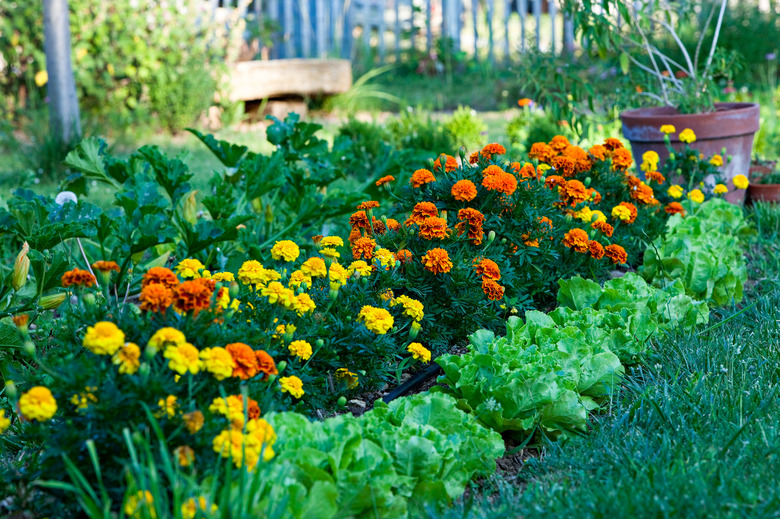What Are Good Companion Plants For Marigolds?
If you are in the market for marigold companion plants, there's plenty to choose from. By pairing flowers and vegetables with marigolds (Tagetes spp.), you'll find your garden is more attractive, plant health is supported, pests and nibbling creatures are deterred, and new seeds will be ready to harvest for next season.
Tip
Good companion plants for marigolds are those that are susceptible to the pests that marigolds deter, including lavender, salvia, roses, basil, cucumbers, squash, and many more.
The Best Marigold Companion Flowers
The Best Marigold Companion Flowers
When it comes to marigold companion plants, there's a lot to consider. Choose species with the same growing conditions. Overall, marigolds thrive in the sun, can withstand hot summers, and grow in nearly any type of soil, but are happiest in fertile, well-drained soil. The African and signet marigolds are drought tolerant while French marigolds do better in wet conditions.
Size matters. Marigolds range from 6 inches to 3 feet, depending on the species. African marigolds tend to look their best when placed at the back of a flower bed. Finally, complement the gold, copper, and brass hues with similar or complementary colors. Blue and purple flowers are gorgeous next to yellow and orange ones. Keeping all this in mind, the best marigold companion flowers include allium, coreopsis, roses, salvia, bachelor buttons, lavender, and geraniums.
Support Plant Health and Ward Off Pests
Support Plant Health and Ward Off Pests
Companion planting involves placing different plant species in proximity to one another for mutual benefit. It's a win-win situation: Your garden becomes more attractive, pesky bugs are kept at bay, and helpful insects and pollinators stop by for a visit.
Marigolds are a gardener's best friend. The distinctive smell of this flower deters rabbits and other hungry creatures from nibbling on your plants. In fact, marigolds repel the destructive impacts of aphids, potato beetles, flea beetles, corn earworms, Japanese beetles, and squash beetles. On top of this, French marigolds, in particular, repel harmful nematodes (microscopic worms), including root-knot and lesion nematodes, that damage the roots of garden vegetables, especially those of tomatoes, cucumbers, strawberries, snap beans, squash, onions, and garlic.
For all these reasons, the best marigold edible companions are potatoes, cucumbers, strawberries, squash, zucchini, melon, corn, basil, and peppers.
Companion Plants for Tomatoes
Companion Plants for Tomatoes
French marigolds have a specific smell that wards off whiteflies, insects that excrete honeydew on leaves. Whiteflies cause black mold to grow, weakening the plant's ability to flourish. Given this, planting this marigold species under or next to tomatoes in the garden can stop these pests from wreaking havoc.
If the soil is warm, marigolds germinate quickly, sometimes in as few as five days, providing you with a rapid solution for unwanted visitors. You can purchase affordable plugs and place them in borders, pots, or growing bags between plants. Most important, make sure to keep marigolds and tomatoes at least 4 inches apart. In addition to whiteflies and nematodes, the potent scent of marigolds can deter tomato hornworms, squash bugs, and cabbage worms.
